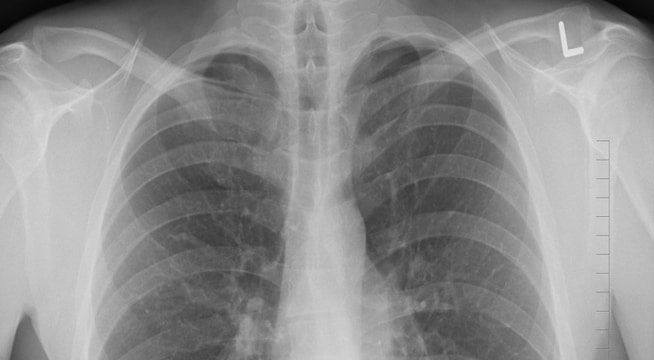How Do You Know If You Have a Broken Rib?
Breaks & Fractures
•
Nov 16, 2018

When you look at the human anatomy, it’s immediately obvious the large role the ribcage plays. Twelve ribs on each side, all of them working together to shield your heart and lungs from potential injury.
If you’re experiencing pain in your torso, it may serve you well to find out whether it’s due to a fractured rib. Because failing to treat a broken rib could lead to the damage of blood vessels or internal organs, you could quickly face life-threatening complications.
Broken Rib Causes
The most common reason for a broken rib is blunt impact. It could be caused by:
- Falls
- Car accidents
- Sports injuries
Injuries can range from a hairline fracture to multiple breakpoints. Sometimes the trauma will cause a single breakpoint, or if it’s severe enough, it could result in multiple ribs being fractured.
Broken Rib Symptoms
If you experienced a forceful impact, you’ll feel pain around your ribcage instantly. However, the injury isn’t always so obvious. On some occasions, a person will start suspecting they may have a fracture when they feel any of the following:
- Shortness of breath
- Pain when breathing, laughing, coughing or sneezing
- Swelling
- Tenderness to the touch
Broken Rib Treatment
When someone breaks a rib, they need to take plenty of time to rest. If the injury was caused by playing sports, it doesn’t matter how competitive the patient, it’s time to avoid participating for a while.
In addition, the following suggestions foster healing:
- Sleep in an upright position
- Hold a pillow against the chest when coughing or sneezing
- Avoid lifting heavy objects
- Ice the injured area for 20 minutes at a time
- Wear loose clothing
- Avoid laying down for an extended period of time
For more serious fractures, the patient may require surgery, either to realign the bones or to remove a diseased portion of the ribcage.
Broken Ribs Recovery Time
If a patient undergoes non-surgical treatment, full recovery could take up to 6 weeks. In the case of surgery, recovery could be extended to 10 weeks.
While recovering and taking the necessary prescription medications, avoid consuming alcohol and operating heavy machinery.
Risk Factors for Broken Ribs
If any of the factors below apply to you, you may have a higher likelihood of experiencing a rib fracture:
- Playing contact sports
- Osteoporosis
- Cancer
- Postmenopause
- Being 65 or older
- Physical abuse
- Bone tumors
- Severe cough
- Obesity
- Prior rib fractures
Broken Ribs Complications
A common complication of risk fractures is pneumonia. This is because pain from the injury causes so many breathing difficulties for the patient.
Another serious complication is bruising the lungs. When this occurs, the person will feel shortness of breath, lightheadedness, and a sharp pain on the chest. If you’re experiencing any of these symptoms, seek emergency care immediately.
Prevention of Broken Ribs
If you or a loved one plays a contact sport, always wear safety equipment that adequately protects your core and ribs. Ribs protect several vital organs within your body, such as your lungs and heart, and wearing the proper safety equipment could truly save your life in a perilous situation.
In addition, following the suggestions below will help prevent rib fractures:
- Always wear a seatbelt while in a motor vehicle
- Modify home to prevent falls, such as installing grab bars in the shower
- Maintain a healthy weight
- Consume foods rich in Calcium and Vitamin D
24-Hour Emergency Room Services in Colorado Springs and Texas
If you think you may have a broken rib, we can provide you the care you need. If you have questions or need immediate treatment, your nearest Complete Care location is ready to help, no matter the time of day or night. We offer a variety of services to help you and your family in your time of need. No appointments are necessary.
